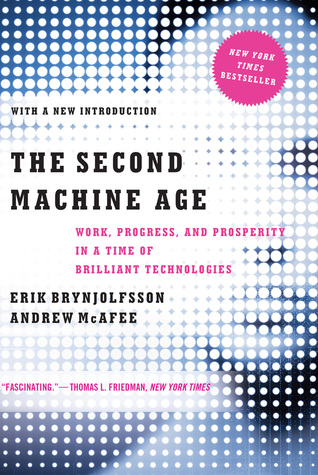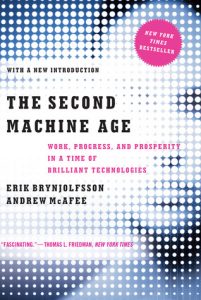
 The rapid advancement of technology lately has potentially big implications on society. The book “The second machine age” by Erik Brynjolfsson and Andrew McAfee is taking a look at exactly that. Here the points I took away:
The rapid advancement of technology lately has potentially big implications on society. The book “The second machine age” by Erik Brynjolfsson and Andrew McAfee is taking a look at exactly that. Here the points I took away:
- Many innovations happen through recombination of existing inventions. With the increasing number of inventions the possible recombinations are also increasing, making it take more effort to find the next good recombination. The argument goes into the direction of enabling more people on earth to participate in the recombination process, by spreading education and access to the internet.
- We have seen sustained exponential improvements. The advances in so many parallel fields at the same time these are all fueling each other. The data we can collect and the amounts of data we can process increase at a staggering rate.
- Moravec’s paradox: “it is comparatively easy to make computers exhibit adult level performance on intelligence tests or playing checkers, and difficult or impossible to give them the skills of a one-year-old when it comes to perception and mobility.”
- Nice saying: Things happen gradually and then suddenly
- Significant organizational innovations will be required to facilitate new innovations fully
- Promising automation and innovation happens where it is possible to digitize many manual steps
- We see the emergence of winner-take-all economics, where the second has no room anymore. That also means increased volatility, since the best can easily become the second best and then another company wins the market.
- Technology not only lowered marginal costs but also fixed costs, inventory costs and search costs
- The income distribution is moving to resemble a power-law, with very few people earning incredibly big amounts of money
- Productivity and employment become decoupled for the first time in the 2000s
- There is an increase in spread of poor and rich and a boost to the possible bounty for those who are successful
- Capital is favored over labor
- Different views on unemployment, one is that there is a permanent decrease in the need of workers, another that we need unemployment to get free capacity for new innovations that need workers, with different skills though, interesting analogy: like firemen waiting to be called into action
- Production workers will disappear like horses from agriculture vs. there are still more jobs created than destroyed
- Some work not needed anymore today even at 0 price like using horses
- Off-shoring is only a way-station on the road to automation
- Human domain: ideation, good ideas
- You’ll be payed in the future by how well you work WITH robots
- The bottleneck increasingly is the ability to interpret and use data
- Sometimes one man’s creativity is another machines brute force analysis
- Peer economy companies will provide labor
- New logos might emerge: “Made by humans”, we need to systematically test ideas on how to keep people employed
- Dystopian (machines take over) vs. utopian (the world becomes an amazing place full of wonders) future
Interesting web sites mentioned: Quirky, Innocentive, Kaggle, Affinnova, Standford AI Course, Khan Academy, Knack, TopCoder, TaskRabbit, secondmachineage.com